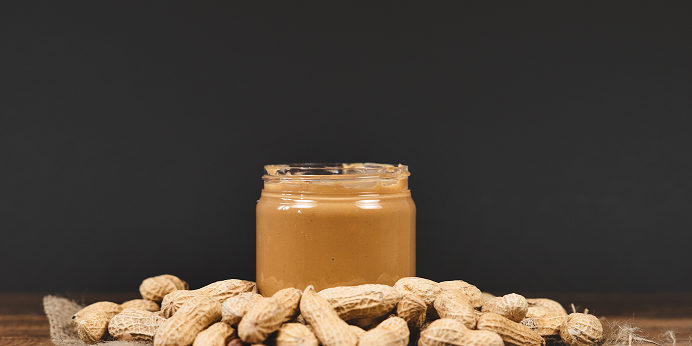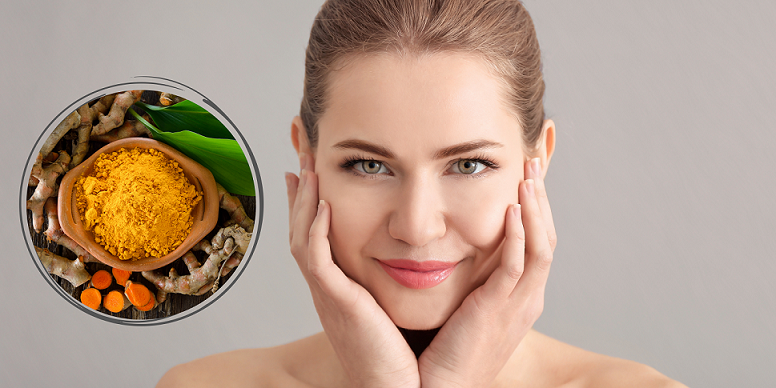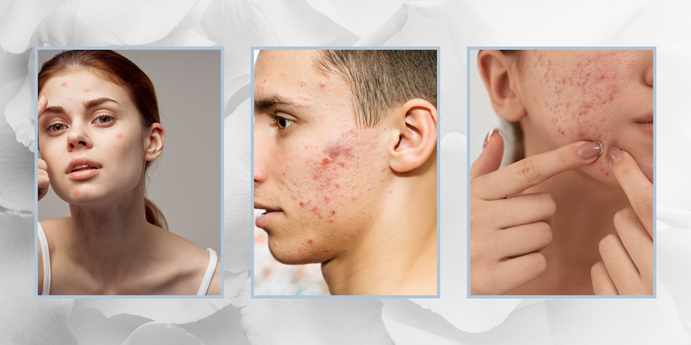
Does Peanut Butter Cause Acne? Debunking Myths and Offering Clear Skin Solutions
Imagine waking up to a sudden breakout of pimples before an important event. The frustration is palpable. As you frantically search for a culprit, your eyes land on the jar of peanut butter on your kitchen counter or in my case a half dozen buckeyes from the Christmas cookie tray. Could this be a case of “does peanut butter cause acne”? Is peanut butter the unsuspected villain behind your acne?
I decided to write this blog today because I had a new acne client in the other day and as we were going over nutrition, we talked about peanut butter and this clients eyes lit up like a light bulb. She immediately suspected her peanut butter consumption could be contributing to her acne breakouts. It's not common but I still thought sharing why would be helpful for some who really struggle to achieve clear skin.

Key Takeaways
-
Consumption of peanut butter with high omega-6 fatty acids and added sugars may increase inflammation and aggravate acne.
-
Hormonal factors, such as an imbalance caused by consuming peanut butter, can lead to increased sebum production and acne development.
-
Adopting a proactive approach to acne prevention through dietary habits and lifestyle modifications can help reduce the risk of developing it.
Peanut Butter and Its Components

Peanut butter, a household favorite, is more than just a creamy spread for your toast or protein shake. This versatile condiment is composed of peanuts, with often added ingredients like molasses or sugar, and hydrogenated vegetable oils, such as soybean oil, have a darker side regarding skin health. Some potential adverse effects of peanut butter on skin health include:
- Omega-6 fatty acids, which can act as potential triggers for inflammation
- Added sugars, which can cause blood sugar spikes
-
Vegetable oils, which may increase the risk of acne
High peanut butter intake, particularly those loaded with additives like sugar and hydrogenated oils, may be among the worst foods for acne-prone skin. Roasted peanuts, the main ingredient in peanut butter, have been identified as a potential acne trigger. Commercial peanut butter additives can further aggravate skin conditions.
Despite these potential pitfalls, peanuts do contain considerable amounts of beneficial nutrients, such as niacin, folate, and vitamin E.
Omega-6 Fatty Acids and Inflammation
Omega-6 fatty acids in peanut butter might not be your skin’s best friend. A type of lectin found in peanuts, known as peanut agglutinin, can disrupt the integrity of the intestinal wall, leading to leakage and potentially resulting in inflammatory acne. Ever heard of leaky gut syndrome? It is possible this can contribute to this condition.
Different peanut butters may have varying concentrations of omega-6 fatty acids, added sugars, and vegetable oils, which can result in inflammation and acne breakouts. When I'm shopping for my beloved jar of peanut butter, I struggle to find a brand that has nothing but peanuts and maybe some salt. Most peanut butters have added ingredients in the United States.
Consuming peanut butter with high omega-6 fatty acids content and added sugars may lead to inflammation and acne flare-ups. This inflammation may result from elevated blood sugar levels due to the presence of omega-6 fatty acids, added sugars, and vegetable oils in peanut butter, resulting in hormonal imbalances and potentially worsening acne.
Added Sugars and Blood Sugar Spikes
Moving on to another accomplice in the peanut butter-acne saga: added sugars. The added sugars in peanut butter could contribute to your acne breakouts by causing blood sugar spikes. These spikes in blood sugar can subsequently lead to hormonal imbalances, resulting in acne.
In essence, the consumption of peanut butter with added sugars can result in blood sugar spikes, which can then lead to hormonal imbalances and acne. So, the sweet taste of your favorite peanut butter could be a bitter pill for your skin!
I know that sugar is found in so many foods, and looking at the ingredients of all your foods, including your favorite jar of peanut butter, may be a good start at reducing your sugar intake.
Vegetable Oils and Skin Health
Finally, we turn to vegetable oils. These oils in peanut butter can negatively impact skin health and contribute to acne. Certain oils, like canola, sunflower, and soybean, are high in omega-6 fatty acids. This can lead to chronic inflammation, which is harmful for those with acne-prone skin. People who aren't acne-prone may have no issue with added ingredients.
Consumption of partially hydrogenated vegetable oils or trans-fat may increase the risk of acne. Also, peanuts contain lectins which can disrupt the integrity of the intestinal wall, leading to leakage and ultimately resulting in inflammatory acne. As we can see, while peanut butter may be a treat for the taste buds, it might not be the same for your skin!
Analyzing the Peanut Butter-Acne Connection

Almond butter as a healthy alternative to peanut butter
While these components may seem problematic, the link between peanut butter and acne isn’t straightforward. Some peanut butter elements, like omega-6 fatty acids, might worsen acne but reactions vary between individuals.
Consuming peanut butter may result in a breakout due to:
- inflammation
- increased secretion of hormones that can lead to acne
- leaky gut syndrome
- digestive issues
-
hormonal acne that is driven by insulin
Yet, it’s worth mentioning that each person’s skin response to peanut butter can differ, adding complexity to the issue. When I see a new acne client, I pretty much tell them if they are a heavy peanut butter eater to either switch to another nut butter or use a natural peanut butter with no added ingredients. This includes salt, as I'm unsure if iodine's are added with the salt. You can read more about how iodines can cause acne in my recent blog HERE.
Hormonal Factors and Sebum Production
One of the key players in the peanut butter-acne connection is hormonal imbalance. Consuming peanut butter can increase androgen levels, which may result in increased sebum production and the development of acne. Other foods that increase androgen levels and should be avoided include shellfish, wheat germ, and corn oil.
The overproduction of sebum can result in the emergence of acne. When sebum mixes with dead skin cells, it can clog pores, forming acne lesions. The excess sebum provides a conducive environment for the growth of bacteria that can cause acne, further exacerbating its development.
To prevent acne from forming, it's essential to keep those pores exfoliated. So, even if you aren't willing to give up your favorite brand of peanut butter, there are still ways you can clear your acne. I've got a full acne coaching program that talks about foods that trigger acne and a full routine of at-home products you will use to get clear skin. You can read more about my acne coaching programs here.
Individual Reactions and Sensitivities
While hormones are a significant factor, individual reactions to peanut butter also contribute to the overall picture. The varied reactions to peanut butter, mirroring the diversity of its consumers, make it challenging to definitively link peanut butter and acne. That's why there is such little research on the subject.
Some individuals may have a sensitivity to peanut butter, which can trigger acne due to several factors like inflammation, increased sebum production, and the high Omega-6 and lectin content in peanuts. In such cases, individuals may need to reduce their consumption of peanuts.
Healthy Alternatives to Peanut Butter
If your skin negatively reacts to peanut butter there are healthier alternatives are available. Almond, cashew, and macadamia nut butters are a few substitutes, equally tasty and satisfying. Just make sure they are natural without added sugars and oils.
These alternatives to peanut butter are not only delicious but also have a lower omega-6 fatty acid content, making them a healthier choice for your skin. However, just like with peanut butter, their effects on acne will depend on the individual.
- Almond butter
- Cashew butter
- Sunflower seed butter
- Tahini (sesame seed paste)
-
Pumpkin seed butter
Tips for Managing Acne from Peanut Butter Consumption
Even though peanut butter might trigger acne, you can manage and lessen its effects. Strategies include dietary adjustments, a consistent skincare routine, lifestyle changes, and topical treatments.
Monitoring your peanut butter intake, diversifying your nut butter options, reducing consumption of omega-6 fatty acids, and increasing your intake of omega-3 fatty acids are just a few dietary adjustments that can help manage acne.

Incorporating a skincare regimen that includes:
- Cleansing
- Toning (optional)
- Icing acne breakouts
- Topical acne products like benzoyl peroxide and mandelic acid
- Moisturizing
Some individuals may have a sensitivity to peanut butter, which can trigger acne due to several factors like inflammation, increased sebum production, and the high Omega-6 and lectin content in peanuts. In such cases, individuals may need to reduce their consumption of peanuts.
I have an entire acne coaching program that goes into fine detail about what it takes to achieve clear skin by using the above products. Feel free to check it out HERE or read more about what I do for my in-person spa clients by visiting my spa website Vanilla Sugar Face & Body.
Healthy Alternatives to Peanut Butter
Diet significantly influences acne management. Limiting or diversifying your peanut butter intake can help lessen acne breakouts. If you observe recurring acne after consuming peanut butter, reducing your intake or trying alternatives like almond or cashew butter may be helpful.
Additionally, incorporating nutrient-rich foods such as:
- carrots
- pumpkin
- beans
- spinach
- kale
- brown rice
-
healthy fats
You can manage your acne effectively by keeping track of your intake of potential acne triggers.
Skincare Regimen
Besides diet changes, a successful skincare routine is key in managing acne. This includes gentle cleansing, exfoliation, hydration, and the use of non-comedogenic makeup.
Choosing the right cleanser for your skin can make a world of difference. Choose our Products like ACNE PEEL 5%, ALPHA BETA CLEANSER 6 OZ, and ALPHA BETA CLEANSER 2 OZ can be beneficial for acne-prone skin. Remember, moisturization is essential even for acne-prone skin, so be sure to choose non-comedogenic moisturizers that provide hydration without blocking pores.
Lifestyle Changes

Practicing stress-relieving activities in a peaceful environment
Your lifestyle also affects your skin health. Maintaining hydration, managing stress, and getting quality sleep are all key in reducing acne. Here are some tips to help you improve your skin health:
- Adequate hydration maintains skin hydration, regulates oil production, and flushes out toxins, resulting in clearer skin.
- Stress can exacerbate acne by intensifying the breakouts, so it’s important to have stress management techniques in place.
-
Lastly, obtaining sufficient sleep is essential for optimal skin health. The National Sleep Foundation suggests adults should aim for 7-9 hours of sleep per night.
Topical Treatments
Topical treatments are another effective way to manage acne. Some examples of topical treatments for acne include:
- Products containing salicylic acid
- Products containing benzoyl peroxide
- Products containing tea tree oil
-
Products containing green tea extract
These treatments can help reduce inflammation, unclog pores, and kill bacteria, leading to clearer skin.
Benzoyl peroxide, for instance, is one of the primary components found in numerous anti-acne facial cleansers and lotions. It acts to eliminate bacteria beneath the skin and facilitate the shedding of dead skin cells in the pores, aiding in treating acne. Salicylic acid, on the other hand, unclogs pores, eliminates dead skin cells, and breaks down sebum, which contributes to acne. It also reduces inflammation and redness associated with acne.
When I'm working with my clients I have them use both ingredients, because they work well together and acne is really hard to clear for many people. The saying two is better than one is pretty accurate in this situation.
The Role of Diet in Overall Skin Health
Diet significantly affects overall skin health. Some foods can cause acne, while others can encourage clear skin. Specifically, dairy products have a more defined correlation with acne. I'll save that topic for a future blog!
Maintaining a balanced diet is key in preventing acne. This involves scrutinizing the ingredient labels of every purchased item to steer clear of hidden sugar and vegetable oils. Foods rich in omega-3 fats, vitamin A, vitamin C, vitamin E, zinc, and selenium are known to benefit skin health. These include leafy greens like spinach and kale, fatty fish such as salmon and tuna, and vegetables like sweet potatoes.
On the other hand, processed foods, particularly those high in sugar and fat content, can have a detrimental effect on skin health and can lead to acne breakouts.
Foods to Avoid
For individuals prone to acne, certain foods should be avoided. These include dairy, high-glycemic foods, and excessive vegetable oils. High-glycemic foods can have a detrimental effect on acne by increasing insulin levels in the body, leading to increased sebum production and inflammation.
Excessive vegetable oils can also disrupt the delicate hormonal balance, contributing to the emergence of cystic acne. As an alternative, olive oil is suggested. Furthermore, certain dairy products like skim milk and low-fat milk have been known to exacerbate acne.
Foods to Include
On the flip side, there are foods that can promote skin health. Fresh fruits, vegetables, and lean proteins are beneficial for maintaining healthy skin. Papaya, berries (such as blueberries, strawberries, raspberries, and blackberries), apples, and mangoes are some of the fruits suggested for a healthy skin diet. Broccoli, spinach, kale, and carrots are some of the vegetables that can be advantageous for skin health. Lean proteins provide essential amino acids for collagen production, antioxidants to protect the skin, and regulate oil production, thus contributing to skin health.
Prevention Strategies for Acne-Prone Individuals
Prevention is better than cure. For those predisposed to acne, preventive strategies include monitoring dietary habits, maintaining a consistent skincare regimen, and implementing necessary lifestyle modifications.
Keeping track of the intake of potential acne triggers can be advantageous. Here are some tips to help prevent acne:
- Consuming increased amounts of omega-3 fatty acids
- Abstaining from dairy products
- Moderating consumption of processed foods and sugary items
- Reducing stress
- Obtaining sufficient sleep
-
Abstaining from harsh skincare products
Following these tips may be beneficial in limiting the acne risk.
Summary
In conclusion, while peanut butter has been implicated in acne breakouts, it’s clear that the relationship is complex. The components of peanut butter, hormonal factors, individual reactions, diet, skincare regimen, and lifestyle all play a role in the development and management of acne. While managing acne can be a challenge, with the right information and strategies, it’s possible to enjoy your favorite spread without compromising your skin health.
Frequently Asked Questions

A woman with question marks
Can peanut butter make you break out?
Peanut butter contains omega-6 fatty acids which can lead to blocked pores, contributing to acne. A high quantity of Omega 6 fatty acids in peanut butter can cause the skin to produce more sebum, resulting in an overproduction of oily substances that can contribute to acne. Therefore, consuming peanut butter may lead to breakouts.
What foods triggers acne?
Certain foods such as milk, raisins, dates, prunes, pasta, and those that are high on the glycemic index like soda, white bread, white rice, and cake can contribute to acne breakouts. Eating too much sugar and dairy products can also cause worse acne.
Is peanut butter good for the skin?
Peanut butter is an excellent choice for those with dry or sensitive skin, due to its moisturizing properties and rich content of monounsaturated fats, proteins, and essential fatty acids. Therefore, it can help improve skin health.
Does peanut butter clog your pores?
Peanut butter has a high concentration of omega-6 fatty acids and lectins, both of which can damage the skin and lead to blocked pores, contributing to acne. Additionally, it contains added sugars that can trigger insulin-driven hormonal acne. As a result, it is best to avoid consuming peanut butter.
What are some healthier alternatives to peanut butter?
Healthier alternatives to peanut butter include almond, cashew, and macadamia nut butters.



